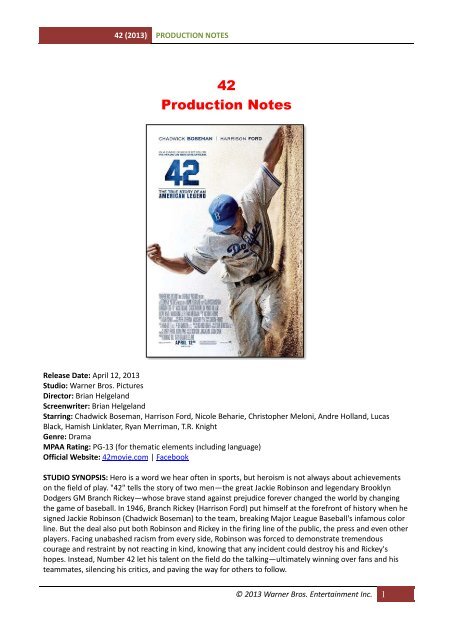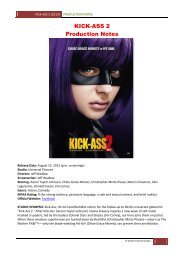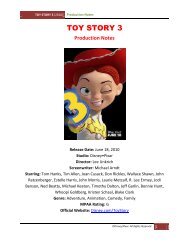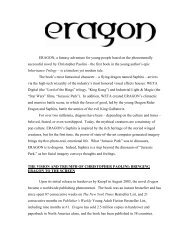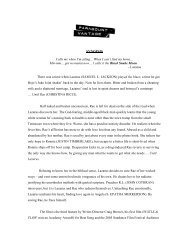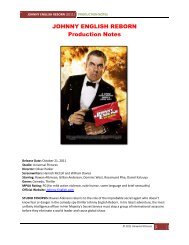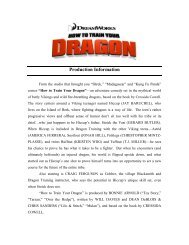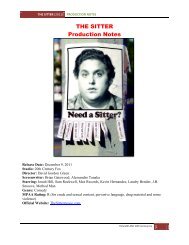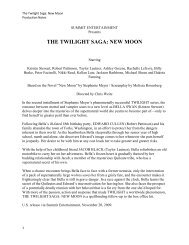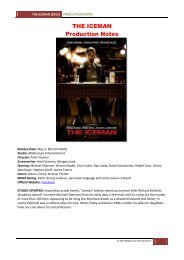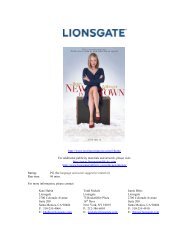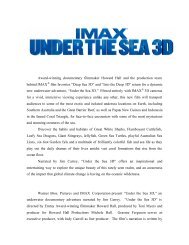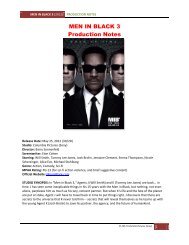42 Production Notes - Visual Hollywood
42 Production Notes - Visual Hollywood
42 Production Notes - Visual Hollywood
Create successful ePaper yourself
Turn your PDF publications into a flip-book with our unique Google optimized e-Paper software.
<strong>42</strong> (2013) PRODUCTION NOTES<br />
<strong>42</strong><br />
<strong>Production</strong> <strong>Notes</strong><br />
Release Date: April 12, 2013<br />
Studio: Warner Bros. Pictures<br />
Director: Brian Helgeland<br />
Screenwriter: Brian Helgeland<br />
Starring: Chadwick Boseman, Harrison Ford, Nicole Beharie, Christopher Meloni, Andre Holland, Lucas<br />
Black, Hamish Linklater, Ryan Merriman, T.R. Knight<br />
Genre: Drama<br />
MPAA Rating: PG-13 (for thematic elements including language)<br />
Official Website: <strong>42</strong>movie.com | Facebook<br />
STUDIO SYNOPSIS: Hero is a word we hear often in sports, but heroism is not always about achievements<br />
on the field of play. "<strong>42</strong>" tells the story of two men—the great Jackie Robinson and legendary Brooklyn<br />
Dodgers GM Branch Rickey—whose brave stand against prejudice forever changed the world by changing<br />
the game of baseball. In 1946, Branch Rickey (Harrison Ford) put himself at the forefront of history when he<br />
signed Jackie Robinson (Chadwick Boseman) to the team, breaking Major League Baseball's infamous color<br />
line. But the deal also put both Robinson and Rickey in the firing line of the public, the press and even other<br />
players. Facing unabashed racism from every side, Robinson was forced to demonstrate tremendous<br />
courage and restraint by not reacting in kind, knowing that any incident could destroy his and Rickey's<br />
hopes. Instead, Number <strong>42</strong> let his talent on the field do the talking—ultimately winning over fans and his<br />
teammates, silencing his critics, and paving the way for others to follow.<br />
© 2013 Warner Bros. Entertainment Inc. 1
<strong>42</strong> (2013) PRODUCTION NOTES<br />
Synopsis<br />
Hero is a word we hear often in sports, but heroism is not always about achievements on the field of<br />
play. "<strong>42</strong>" tells the story of two men—the great Jackie Robinson and trailblazing Brooklyn Dodgers<br />
GM Branch Rickey—whose brave stand against prejudice forever changed the world by changing<br />
the game of baseball.<br />
From Academy Award® winner Brian Helgeland ("L.A. Confidential") comes the real-life drama<br />
"<strong>42</strong>," starring Chadwick Boseman ("The Express") as Jackie Robinson and Oscar® nominee Harrison<br />
Ford ("Witness") as Branch Rickey.<br />
In 1947, Branch Rickey put himself at the forefront of history when he signed Jackie Robinson to<br />
the Brooklyn Dodgers, breaking Major League Baseball's infamous color line. But the deal also put<br />
both Robinson and Rickey in the firing line of the public, the press and other players.<br />
Facing blatant racism from every side, even his own team, Robinson was forced to demonstrate<br />
tremendous courage and restraint by not reacting in kind, knowing that any incident could destroy<br />
his and Rickey's hopes. Instead, Number <strong>42</strong> let his talent on the field do the talking—ultimately<br />
winning over fans and his teammates, silencing his critics, and paving the way for others to follow.<br />
In 1997, Major League Baseball retired the number <strong>42</strong> for all teams, making it the first number in<br />
sports to be universally retired. The only exception is every year on April 15th—Jackie Robinson<br />
Day—commemorating the date of his first game as a Brooklyn Dodger. On that day alone, players<br />
from every team proudly wear the number <strong>42</strong> to honor the man who altered the course of history.<br />
Rounding out the main cast of "<strong>42</strong>" are: Nicole Beharie as Rachel Robinson; Christopher Meloni as<br />
Leo Durocher; Andre Holland as Wendell Smith; Lucas Black as Pee Wee Reese; Hamish Linklater<br />
as Ralph Branca; and Ryan Merriman as Dixie Walker.<br />
Written and directed by Brian Helgeland, "<strong>42</strong>" is produced by Thomas Tull, with Dick Cook, Jon<br />
Jashni, and Jason Clark serving as executive producers, and Darryl Pryor and Jillian Zaks coproducing.<br />
Helgeland's behind-the-scenes collaborators included Oscar®-nominated director of photography<br />
Don Burgess ("Forrest Gump"), production designer Richard Hoover, costume designer Caroline<br />
Harris, and editors Kevin Stitt and Peter McNulty. The music is composed by Oscar® nominee<br />
Mark Isham ("A River Runs Through It").<br />
Warner Bros. Pictures and Legendary Pictures present, a Legendary Pictures <strong>Production</strong>, a Brian<br />
Helgeland film, "<strong>42</strong>." The film opens on April 12, 2013, in time to commemorate the 66th anniversary<br />
of Jackie Robinson Day, on April 15th.<br />
The film has been rated PG-13 for thematic elements including language.<br />
© 2013 Warner Bros. Entertainment Inc. 2
<strong>42</strong> (2013) PRODUCTION NOTES<br />
About the <strong>Production</strong><br />
BRANCH RICKEY<br />
I want a player who's got the guts not to<br />
fight back... Your enemy will be out in force,<br />
and you cannot meet him on his own low ground...<br />
JACKIE ROBINSON<br />
You give me a uniform,<br />
you give me a number on my back,<br />
and I'll give you the guts.<br />
On April 15, 1947, Jackie Robinson emerged from the tunnel at Ebbets Field in a Brooklyn Dodgers'<br />
uniform bearing the number <strong>42</strong>. In that instant, he broke Major League Baseball's infamous<br />
color line. Simply put, that is the extent of what most people know about him in the context of history.<br />
However, few today can fully comprehend what that meant in the context of human experience.<br />
And the whole of what he achieved was anything but simple.<br />
Brian Helgeland, the writer and director of "<strong>42</strong>," reveals that he, like others, was unaware of the<br />
level of opposition and overt bigotry Robinson faced as the first African American to play for any<br />
major league team. "I thought I knew a lot about Jackie Robinson, but when I began researching the<br />
story, I realized I knew very little about that time and what he actually went through. I wanted to<br />
make a film that was entertaining but also one that shows what a big breakthrough it was then and<br />
how it still resonates today."<br />
Producer Thomas Tull, a self-described baseball fanatic, offers, "I went to the Baseball Hall of<br />
Fame when I was seven years old, which is when I first learned about Jackie Robinson, and his story<br />
stayed with me. It touched me and made me wonder what it was like for him because it's hard for<br />
me to fathom what he endured, both as a baseball player and as a man. It really is a classic hero's<br />
journey—someone who has unbelievable odds stacked against him and has the fortitude to overcome<br />
those odds and effect great change. When he broke the color line, it marked a turning point,<br />
not only in baseball but in history. In that way, it is a moment that transcends sports."<br />
Chadwick Boseman, who stars as the baseball legend, agrees. "Once you know the full scope of<br />
what he did—on the baseball field and in his later work in the Civil Rights movement—you realize<br />
that his contribution to society was tremendous, and not just in the sports world. He paved the way<br />
for people in every field, so I feel a personal connection to him because I am literally standing on<br />
his shoulders right now."<br />
In the racial climate of 1940s America, it arguably took as much courage to be the man who opened<br />
the door to integrating Major League Baseball as it did to be the man who walked through it. It was<br />
Brooklyn Dodgers President and General Manager Branch Rickey, who—despite vehement opposition<br />
from the league, the public and his own players—signed Jackie Robinson to his team. "Branch<br />
Rickey is a great, albeit forgotten, figure," says Helgeland. "Historians and those in baseball know<br />
who he was, but the average person has no idea. He'd given his life to the game and thought very<br />
deeply about how to improve it. When he was 65 and could have just rested on his laurels, he bravely<br />
decided to put it all on the line and be at the forefront of integrating baseball."<br />
Harrison Ford, who portrays the visionary baseball executive, states, "It's an incredible story about a<br />
critical step that was taken in confronting the issue of inequality. It was a moment when, ultimately,<br />
© 2013 Warner Bros. Entertainment Inc. 3
<strong>42</strong> (2013) PRODUCTION NOTES<br />
we shined. A moment when we responded to the ideals of America, and finally matched the nobility<br />
of our words and ambitions with our actions."<br />
Tull saw an opportunity to bring this seminal story to contemporary audiences when he was introduced<br />
to the love of Jackie's life, Rachel Robinson. He relates, "I had the chance to tell her about<br />
the lifelong admiration I had for her husband and my passion to tell this story, and she entrusted us<br />
with the project, which was, and is, an honor."<br />
The producer soon discovered that his enthusiasm for the subject was shared by Helgeland. "We've<br />
worked with Brian before and think he is an amazing talent," says Tull. "At the time I called him, he<br />
happened to be in Brooklyn, which I took as kind of a sign. From the moment I told him about my<br />
idea for a movie about Jackie Robinson, he was totally committed."<br />
Helgeland knew that it would be impossible to do justice to the entire Jackie Robinson story in a<br />
single film. Therefore, he decided to focus on the pivotal years of 1945 through `47, during which<br />
time, Helgeland details, "he got married, signed with the Dodgers' minor league affiliate, the Montreal<br />
Royals, and then made his major league debut."<br />
Robinson's public persona and on-field accomplishments are well-documented, but capturing his<br />
more private side presented a challenge. Helgeland affirms, "To have a character who comes with a<br />
ready-made history and anecdotes you can read about is obviously a huge advantage as a writer, but<br />
it was important for me to get out of the way and not insert my own opinions or set of rules. The<br />
most difficult thing was getting inside of him, so I was fortunate to be able to draw from people<br />
who knew Jackie: especially the woman with whom Jackie spent his life, Rachel Robinson. She has<br />
kept her husband's legacy alive all these years through the Jackie Robinson Foundation and was an<br />
invaluable resource."<br />
It was vital to the filmmakers that the relationship between Jackie and Rachel be as fundamental to<br />
the movie as it was to Jackie's success. Tull attests, "In talking to Mrs. Robinson, we got the sense<br />
that they had a true partnership—that each of them had an understanding of what they were up<br />
against and faced it together. Whatever he went through on the field, he would come home to a safe<br />
harbor."<br />
Rachel Robinson states, "What I believed then, and still do, is that the challenges made us feel like<br />
it was the two of us against the world. We knew this was an experiment in social change that had to<br />
succeed, so any personal discomfort we felt had to be discussed and put aside for the greater good.<br />
We were fortunate to love each other so much and so deeply that we could carry that belief forward,<br />
and I'm delighted that Brian captured all that in the script. I want young people to know you can go<br />
through terrible times, but if you form strong relationships and use those bonds to keep you committed,<br />
you can make a difference."<br />
THE PLAYERS<br />
Casting began with finding the right actor to embody the film's main character. Helgeland recalls,<br />
"Our casting director, Vickie Thomas, has a terrific eye and brought me great people, but as far as<br />
the part of Jackie Robinson was concerned, I just felt I would know him when he walked in the<br />
door. And that's exactly what happened. Chadwick Boseman read for the role and when he left the<br />
room, I said, 'That's it; the bar has been set.' And no one else came close to it."<br />
© 2013 Warner Bros. Entertainment Inc. 4
<strong>42</strong> (2013) PRODUCTION NOTES<br />
Boseman bears a remarkable resemblance to the real Robinson, but Helgeland says he was more<br />
impressed by what the actor conveyed from within. "You can see him reacting even when he's being<br />
quiet. You know how things are hitting him just looking at his face."<br />
"Sometimes what a person doesn't say is more powerful than what they say," Boseman states. "And<br />
the way Robinson played the game was so outspoken and demonstrative; he was able to perform in<br />
the most clutch moments and on the grandest stages. That spoke volumes, and it added value to<br />
Robinson's words when he did become vocal."<br />
The actor notes that he had to "bridge the gap" between himself and Jackie Robinson, particularly in<br />
terms of the racially charged atmosphere of then versus now. "I had to take it all in and ask myself<br />
what that must have been like. What would that do to me? He obviously feels everything that any<br />
person would feel in that situation: anger, frustration, fear... But he has pride in his race and an unshakeable<br />
sense of self that enables him to stand in the storm, which is a difficult thing to do. It ultimately<br />
comes down to basic human dignity—just respect me as a human being."<br />
Jackie earns the respect of Branch Rickey, who braves his own storm when he signs Robinson to<br />
the Dodgers organization, defying the unwritten but nonetheless explicit segregation of Major<br />
League Baseball. His only caveat is that Robinson not react in kind to the abuse—both verbal and<br />
physical—that will inevitably come his way. "They make a bargain," Helgeland expounds. "Rickey<br />
knows all eyes will be on Jackie, so he has to just play baseball and ignore everything else. If they<br />
are to succeed, Jackie must tolerate things he otherwise wouldn't so people can't use anything he<br />
says or does against him."<br />
Rickey is played by Harrison Ford, who reveals, "When I read the script, I thought it was wonderfully<br />
written; there were scenes that just knocked my socks off. I was fascinated by the character of<br />
Branch Rickey and immediately began to invest some energy in researching him because it was a<br />
part I very much wanted to play."<br />
Despite being an unabashed fan of the actor, Helgeland acknowledges that he was at first a bit reluctant<br />
to cast him as Rickey because of Ford's iconic stature. "Then when we talked, I could tell he<br />
totally embraced the part and understood him exactly as I understood him. He absolutely nailed it."<br />
Describing his role, Ford offers, "He is a businessman who recognizes that dollars aren't black or<br />
white; they are green. But he is also a moralist and a patriot who believes it is unseemly of this<br />
country not to offer opportunities to talented people because of the color of their skin. It's an issue<br />
of fairness, especially in a game that is so woven into the American spirit."<br />
Ford, who had never before portrayed a real historical figure, continues, "I was interested in capturing<br />
the truth of the character; however, at the same time, I was concerned about how much freedom<br />
there would be in the context of becoming an actual person of some significance."<br />
It was Ford himself who suggested that he wear padding and makeup prosthetics to look more like<br />
the real Branch Rickey. Additionally, in his research, he viewed some archival footage and found,<br />
"Rickey had a distinctive way of speaking, so I tried to suggest his voice. I was happy that Brian<br />
gave me the liberty to make those changes to my physiognomy, to give me that mask. He is one of<br />
the most generous and patient directors with whom I've ever had the pleasure to work."<br />
"Harrison is an incredible actor," Tull remarks, "but he's also one of the most recognizable people in<br />
the world. So I was in awe watching him completely disappear into Branch Rickey."<br />
© 2013 Warner Bros. Entertainment Inc. 5
<strong>42</strong> (2013) PRODUCTION NOTES<br />
With Rickey's help, Robinson is placed at the forefront of change, but there is also a woman behind<br />
the man, his wife, Rachel. "The love story is what drew me in," says Nicole Beharie, who was cast<br />
in the role. "Rachel is at Jackie's side on this mission. They have to deal with the bruises, physical<br />
and otherwise, together."<br />
"Nicole is not only beautiful; she has the kind of strength and independence that I wanted to see in<br />
Rachel. I believed her in the role," Helgeland states. "She also had natural chemistry with Chad,<br />
which is something you can't force but was very important."<br />
Beharie had the advantage of being able to consult with her real-life counterpart, Rachel Robinson,<br />
who thrilled everyone when she paid a visit to the set. The actress marvels, "For me, the most amazing<br />
thing was that her love and devotion to Jackie is as tangible and strong as it as it ever was.<br />
That's a powerful thing."<br />
"Rachel had a very emotional response to watching the scenes between Chad and Nicole. If this<br />
movie was able to bring a little of the romance between her and her husband back to her life, we<br />
could not achieve anything better than that," Helgeland smiles.<br />
"Meeting Rachel made me realize that the story is not his, it's theirs," Boseman adds. "They were a<br />
unit—lovers, friends, teammates."<br />
Jackie has another strong ally with a stake in his success. Wendell Smith is an African-American<br />
baseball writer who is hired by Branch Rickey to help guide his controversial rookie through the<br />
politics and pitfalls of his newfound fame. Andre Holland plays the reporter, who is coping with his<br />
own struggles with segregation. He emphasizes, "Wendell is confronted with the same sort of discrimination<br />
in his job; black journalists aren't even allowed in the press box so he is forced to sit in<br />
the stands with a typewriter on his lap. As much as anyone, he knows that breaking the color barrier<br />
in baseball is a beacon of hope for people who have been waiting for change in this country. Wendell<br />
senses the size of the moment and knows he has to do whatever he can to help."<br />
Holland, who had never even heard of Wendell Smith before reading the script, continues, "In researching<br />
him, I discovered he was such an important figure—really an unsung hero. He and Jackie<br />
were fighting the same battle, just on different battlefields. Wendell ended up becoming first African<br />
American to be admitted to the Baseball Writers Association, which was a huge deal. Every day<br />
on the set, I felt an enormous sense of pride to be part of a movie about people who, under dire circumstances,<br />
were able to excel."<br />
DEM BUMS<br />
The filmmakers drafted a team of actors to play the 1947 Brooklyn Dodgers, led by Christopher<br />
Meloni as the famed player-turned-manager Leo Durocher, who utters his immortal words, "Nice<br />
guys finish last." When members of the Dodgers start a petition protesting the addition of Robinson<br />
to the team, Branch makes it Leo's responsibility to put them in their place. Meloni recounts, "Leo<br />
nips it in the bud by telling them they can like it or lump it, but they'd better get used to it or they<br />
can take the train. Color is a non-issue to Leo; he doesn't care if Robinson is black, white or whatever,<br />
as long as he can help the Dodgers win."<br />
"Branch knew that team chemistry was crucial," asserts Helgeland. "A team that didn't have chem-<br />
© 2013 Warner Bros. Entertainment Inc. 6
<strong>42</strong> (2013) PRODUCTION NOTES<br />
istry didn't win. For that reason, he hoped that the men would just accept Jackie Robinson based on<br />
his abilities, but his hopes were probably too high. For one thing, a lot of the players had grown up<br />
in the Jim Crow South, where segregation was a way of life, so that mindset had to be overcome,<br />
which was a massive uphill climb."<br />
The petition drive is headed by Dodgers' right fielder Dixie Walker and pitcher Kirby Higbe, played<br />
by Ryan Merriman and Brad Beyer, respectively. Hamish Linklater portrays pitcher Ralph Branca,<br />
who is one of the first to extend his hand in welcome to Robinson. "All Ralph cares about is winning<br />
the pennant, so his only interest is if Jackie can play, not the color of his skin," says Linklater.<br />
It takes more time for some of the other Dodgers to come around, and two of them do so in dramatic<br />
fashion. The first time is at a game against Philadelphia where the Phillies manager, Ben<br />
Chapman, hurls a merciless barrage of racial slurs and epithets at Robinson whenever he comes up<br />
to bat. The attack is so relentless, it finally breaks the silence of the Dodgers' dugout. Jesse Luken,<br />
who plays second baseman Eddie Stanky, describes, "When Eddie sees the ring of fire that Chapman<br />
is putting Jackie through, he finally says, 'That's enough.' He makes a moral decision to stand<br />
up to Chapman because he knows Jackie can't. And that signifies a change."<br />
The second demonstration of support comes from Dodgers' shortstop Pee Wee Reese, played by<br />
Lucas Black. At a game in Cincinnati, Reese, a native of nearby Kentucky, reacts to the jeers from<br />
the crowd by going over to Robinson and, in a move that stuns everyone, puts his arm around his<br />
teammate's shoulders. In real life, that simple gesture—especially coming from one of the day's<br />
most popular players—was considered such a turning point that there is a statue commemorating it<br />
in Brooklyn.<br />
Black says, "I felt honored to be playing Pee Wee Reese, who was such an awesome player and a<br />
cool guy. He's quoted as saying, 'You can hate a man for many reasons, but color is not one of<br />
them,' so that shows how he ultimately felt about Jackie being his teammate."<br />
Also appearing as members of the Dodgers organization are: T.R. Knight as Harrold Parrott, the<br />
team's traveling secretary; Toby Huss as Clyde Sukeforth, a member of their scouting and coaching<br />
staff; Max Gail as the Dodgers' interim manager Burt Shotton; John C. McGinley as Dodgers playby-play<br />
announcer Red Barber; and Brett Cullen as Montreal Royals manager Clay Hopper. The<br />
main cast also includes Alan Tudyk as Philadelphia Phillies manager Ben Chapman; Gino Anthony<br />
Pesi as Joe Garagiola; and James Pickens, Jr. as Mr. Brock, who declares Jackie "a hero."<br />
Apart from the main cast, the production also needed actors to fill out the Dodgers' roster, as well as<br />
those of their opposing teams. "We wanted to have real baseball players," says Helgeland. "There's<br />
a lot of baseball going on and we wanted it to look natural."<br />
Second unit director and stunt coordinator Allan Graf was responsible for scouting players for "<strong>42</strong>,"<br />
including veterans of both the major and minor leagues and Division 1 college athletes.<br />
Graf also oversaw the training of Chadwick Boseman, who had to learn to play in the unforgettable<br />
manner of his character. Helgeland, who had previously worked with Graf on "A Knight's Tale,"<br />
notes, "Allan was a former football player and has done a lot of football films, so he brought a little<br />
bit of that mentality to the set. It was fitting because Jackie was a star running back at UCLA and<br />
ran bases more like a running back than a baseball player."<br />
"Jackie had a very distinctive run," Graf elaborates. "He used his shoulders and arms like a locomo-<br />
© 2013 Warner Bros. Entertainment Inc. 7
<strong>42</strong> (2013) PRODUCTION NOTES<br />
tive chugging, so Chad worked hard to get that down. We also had him stealing and sliding into bases,<br />
diving for line drives, hitting the ground, turning and throwing the ball. He trained hard for four<br />
months and he ended up looking great."<br />
Boseman reveals that another one of his biggest challenges was "emulating Jackie's batting stance<br />
because our body types are different, and the technique he used to hit was rather unorthodox. I practiced<br />
for hours every day. It was intense, but it was important because, as much as possible, I felt I<br />
had to do my own stunts. I couldn't separate the acting from the stunts because you need to see<br />
Jackie's face; you need to see the courage, the defiance, the fear and even the fun because, at the<br />
end of the day, he loves the game. That's an important aspect of the story."<br />
For two months prior to filming, baseball trainers Dennis Reitz and David Iden coached Boseman<br />
exclusively. But as they got closer to shooting, he was not the only one in training. All of the men<br />
appearing as players were immersed in weeks of physical conditioning and practice at a training<br />
camp run by Graf and baseball coaches Peter J. Smith and Bradley C. Bouras. It wasn't enough for<br />
the actors to be convincing as professional baseball players; they had to adopt what Graf calls the<br />
"rock-n-sock" style of the game in the 1940s.<br />
Helgeland explains, "I think in the `40s baseball was more of a contact sport than it is now, and we<br />
wanted to get that across. I told Allan I wanted to make it gritty and tough with a lot of impact. I<br />
didn't have to say another word. You say 'impact' to Allan and you're off and running," he laughs.<br />
"I don't believe it could have been any more physical," Boseman attests. "I was jumping six feet in<br />
the air, sliding in the dirt, diving for balls, sprinting...and we never knew how many takes we were<br />
going to do. It was tough and there were times it took its toll on us. But on those days when I was<br />
running on fumes, what got me through was thinking about how hard it was for him. I told myself I<br />
had one, maybe two more in me because he would have had one, maybe two more in him."<br />
DIAMONDS IN THE ROUGH<br />
The approach to the game wasn't the only thing that was different. From the ballparks, to the towns<br />
and cities, to the cars and buses, to the uniforms and clothes, every facet of the production had to<br />
reflect a time gone by.<br />
One important aspect of Brooklyn Dodgers baseball that was long gone was the beloved home of<br />
the team, Ebbets Field. In fact, all of the old major league ballparks have, over the years, been upgraded<br />
or completely torn down and replaced by new stadiums. Helgeland corroborates, "Even<br />
Fenway and Wrigley Field have been modernized, so we would have had to do too much to sell<br />
them as being in the period. We were also shooting during baseball season, so that made it unfeasible."<br />
Executive producer Jason Clark and location manager Eric Hooge scoured the South, where they<br />
had learned a number of those old ballparks still exist. They found three that were able to be used in<br />
the production: Engel Stadium in Chattanooga, Tennessee; Luther Williams Field in Macon, Georgia;<br />
and Rickwood Field in Birmingham, Alabama, which is America's oldest existing ballpark.<br />
Perhaps most interestingly, Jackie Robinson had played on all three fields, which was inspiring to<br />
the filmmakers, cast and crew. Boseman says, "Whenever I came up to bat, I always grabbed a little<br />
bit of dirt and rubbed it in my hands as a way to pay homage to him."<br />
© 2013 Warner Bros. Entertainment Inc. 8
<strong>42</strong> (2013) PRODUCTION NOTES<br />
Engel Stadium was selected to serve as Ebbets Field, which turned out to be mutually beneficial to<br />
the production and the stadium. Hooge says, "They were considering tearing it down because it was<br />
in such disrepair. We had to make some modifications, but at the same time, we revitalized it so it<br />
can be used again."<br />
<strong>Production</strong> designer Richard Hoover pored over numerous images of Ebbets Field, studying it from<br />
every angle. In his research, he was also lucky enough to discover digital copies of the original<br />
drawings of the stadium online. He states, "We wanted to be as accurate as possible and also to do<br />
justice to the memory of one of the original baseball palaces in this country."<br />
Using the photos and drawings as a reference, Hoover's team resurfaced the diamond and the outfield;<br />
built an entire section of bleachers set at an exact angle to the baselines; and plastered 1940sera<br />
ads on the walls, among other elements. They even created an exact replica of the Ebbets Field<br />
scoreboard.<br />
Nevertheless, certain components could not be achieved materially, so, Hoover worked closely with<br />
visual effects supervisor Jamie Dixon to recapture Brooklyn, circa 1947. Helgeland says, "The two<br />
of them figured out a way to marry the practical sets to the computer extension in a way that is<br />
seamless."<br />
The crew constructed an enormous green screen wall by placing telephone poles at 10-foot intervals,<br />
which were then sunk 10 feet into the ground to fortify the massive structure. Once secure,<br />
they attached sheets of plywood and painted the entire wall green. Measuring approximately 1200<br />
feet long and 40 feet high, the green screen wrapped around the entire back of the stadium and extended<br />
down each side, allowing the VFX team and design teams to establish the Brooklyn skyline<br />
of 60-plus years ago, the crowded second deck of Ebbets Field, and whatever else was required for<br />
each scene.<br />
The vast green screen also enabled the filmmakers to repurpose Engel Stadium for the Dodgers'<br />
away games: using VFX to turn the stadium into the home fields of the Philadelphia Phillies and the<br />
Cincinnati Reds.<br />
Luther Williams Field was used for segments involving the Dodgers' and the Montreal Royals'<br />
training camps. Notably, Rickwood Field was the actual site of a game between the Kansas City<br />
Monarchs and the Birmingham Black Barons, during Robinson's time in the Negro League.<br />
Helgeland and his cast were thrilled to re-imagine moments from that game in the very place it had<br />
happened.<br />
Baseball action in "<strong>42</strong>" was captured by both the first and second units, but the goal for both was<br />
the same: bring the audience directly into the game. Helgeland notes, "The DP, Don Burgess, and I<br />
decided we weren't going to do a lot of sweeping shots of the stadium. We wanted it to feel like you<br />
were there—sliding into base, seeing if the runner is safe or out, anticipating a pitch in the batter's<br />
box, or standing on the pitcher's mound."<br />
Burgess says he and Helgeland and the design teams also established a specific color palette "to<br />
bring the audience along on the journey with Jackie Robinson from a visual standpoint. We broke it<br />
down by year, from `45 to `47, and I used different gel filters in the lights to create a certain atmosphere<br />
for each year. And all the departments made sure the tone remained consistent in the sets and<br />
costumes."<br />
© 2013 Warner Bros. Entertainment Inc. 9
<strong>42</strong> (2013) PRODUCTION NOTES<br />
Hoover adds, "We talked about keeping a somewhat desaturated color scheme until we entered the<br />
major league stadiums, where everything is heightened, or in the Dodgers' locker room, which features<br />
a strong red wainscoting. We also incorporated the theme of darkness and light, like when<br />
Jackie is coming out of the tunnel at Ebbets and going towards something new."<br />
THE BOYS OF SUMMER<br />
Colors and textures were equally important to costume designer Caroline Harris, who, like Hoover,<br />
spent months researching the styles of the day. "America in the 1940s was documented by many<br />
different photographers with many different viewpoints," she offers. "I gathered reams of images<br />
and covered my walls with them to immerse myself in the era."<br />
She had Harrison Ford's wardrobe made especially for him, designing it to denote a man of Branch<br />
Rickey's formidable stature. Every suit was also carefully fitted to the actor's padded physique. Harris<br />
comments, "I particularly enjoy tailoring and so does Harrison Ford. He came in with such enthusiasm<br />
and knowledge of the character; he was so great to work with."<br />
Harris designed Nicole Beharie's costumes, as Rachel Robinson, to reflect an elegant woman who<br />
always dressed impeccably but in a way that seemed effortless. "Jackie and Rachel Robinson were<br />
both fashionable dressers," she says, "and Chadwick Boseman and Nicole Beharie wore the 1940s<br />
clothing exceptionally well."<br />
Beharie shares, "I fell in love with the period, when the men were such gentlemen and all the women<br />
were poised and dressed like ladies. It was almost like being in another world, and then suddenly<br />
you go home and people are in skin-tight jeans and the music is blaring," she laughs.<br />
Harris and her team were also responsible for making sure that everyone—from the main characters<br />
to the passersby on the street to the hundreds of spectators crowding the stands—was outfitted in<br />
`40s garb. Christopher Meloni recalls, "The costumes absolutely transported back me to that time—<br />
the peanut and popcorn vendors in their white suits and little trays and everyone dressed to the nines<br />
to go out, even to a baseball game. It was beautiful."<br />
"The ball players, especially, were riding high," Harris says. "They were into how they looked and<br />
liked to blow some cash on their wardrobe, so the period clothes some of them wear have a bit of<br />
flash to them."<br />
Their choice of attire on the field, however, was far less personal. "The baseball aspect needed to be<br />
precise," Harris confirms. "The material was pre-washed before the uniforms were cut and assembled<br />
because the heat and humidity was sure to cause sweating and I needed to be sure the fabric<br />
wouldn't surprise us by shrinking or falling apart on the players."<br />
In addition, the team names, logos and numbers were recreated to be exactly as they were at the<br />
time, down to making sure the correct number was on the back of each player at the corresponding<br />
times. For example, Ralph Branca went from 20 to 13 during the 1947 season, taking a teammate's<br />
number when that player was traded.<br />
Major League Baseball was consulted on every detail and was an invaluable resource in ensuring<br />
authenticity on everything from the uniforms to the size of the bats used by particular players.<br />
© 2013 Warner Bros. Entertainment Inc. 10
<strong>42</strong> (2013) PRODUCTION NOTES<br />
Harris also uncovered a collector who had a personal stash of vintage Dodger uniforms. She offers,<br />
"We checked the material and the colors and saw immediately that they were not in the same blue<br />
we refer to today as Dodger Blue. Back then, the team used a much darker blue so we had to make<br />
sure it was the appropriate shade for that decade."<br />
Color is not the only thing that has changed over the years. The period equipment, particularly the<br />
old-style gloves, made it harder even on the most seasoned players. Lucas Black verifies, "I grew up<br />
playing baseball and it took me a while to get used to that glove. But it was amazing to learn more<br />
about the game and about this story. My love of baseball grew so much while making the movie."<br />
The baseball uniforms of the times, including the caps, were predominantly made of wool, and, in<br />
the quest for verisimilitude, so were the uniforms in the film. That was unfortunate for the men on<br />
the field in the southern summer months. "The heat and humidity was tough on the guys having to<br />
wear wool," Helgeland nods. "But I couldn't allow myself to think about it too much because we<br />
would never have made it through the day. I had to say, 'Look, if you want to play baseball, you're<br />
gonna be out in the sun.' But they were all troupers and I appreciated that."<br />
Despite the discomfort, however, the uniforms proved only to add to the positive experience for the<br />
actors. "Putting on the jersey with the number <strong>42</strong> was one of the most magical moments of the<br />
whole movie for me," Boseman affirms.<br />
"When we put on the uniform, we became a team," Ryan Merriman declares. "We hung out together,<br />
sweat together, laughed together and got it done together."<br />
Helgeland offers, "I knew going into this film that the relationship between Robinson and Rickey<br />
was important, and the relationship between Jackie and Rachel was essential, but I didn't realize<br />
how significant the relationship between him and his teammates would be. I read a quote about<br />
Jackie that said he changed the world but refused to let it change him—he came into this situation<br />
and everyone around him would change...or not. That's what happens when he walks into the locker<br />
room in the movie. And I was surprised at the power that took on, which even I didn't expect it<br />
would have."<br />
The filmmakers hope that the power of the story will resonate with moviegoers—those who know<br />
about Jackie Robinson and those first learning about him.<br />
Thomas Tull reflects, "I think '<strong>42</strong>' is not only fascinating in the way it captures a pivotal chapter in<br />
our history, but it's also an exciting and compelling story—one that is both informative and entertaining."<br />
"I believe the spirit of the country is that it is always struggling to be better, that it always wants to<br />
improve," Helgeland concludes, "and Jackie Robinson joining the Dodgers in 1947 was a kind of<br />
beachhead in that fight and in the civil rights movement. The fact that he integrated baseball didn't<br />
mean the issue went away, but it was a place to start to win the battle. Thanks to him and to those<br />
that followed, we've made incredible strides, but it's not won yet."<br />
© 2013 Warner Bros. Entertainment Inc. 11
<strong>42</strong> (2013) PRODUCTION NOTES<br />
About the Cast<br />
CHADWICK BOSEMAN (Jackie Robinson) made his feature film debut in Gary Fleder's 2008<br />
drama "The Express," playing football great Floyd Little. He more recently starred in the independent<br />
psychological post-war drama "The Kill Hole."<br />
A native of South Carolina, Boseman graduated from Howard University and also attended the<br />
prestigious British American Drama Academy at Oxford. He then began his career in the theatre as<br />
a playwright, director and actor.<br />
Boseman wrote the plays "Deep Azure," which was nominated for a 2006 Jeff Award for Best New<br />
Play; "Hieroglyphic Graffiti," which was produced at the National Black Theatre Festival and the<br />
Hip Hop Theatre Festival; and, as co-writer, "Rhyme Deferred," which appears in the Hip Hop Theatre<br />
anthology "The Fire This Time."<br />
In addition, Boseman has directed such plays as "Dutchman," "Wine in the Wilderness," "Indian<br />
Summer," "Spear in the Sun," "The Colored Museum" and "Six Hits."<br />
For the screen, he wrote, directed and executive produced the short film "Blood Over a Broken<br />
Pawn," which won the Jury Award for Short Film at the 2008 <strong>Hollywood</strong> Black Film Festival. He<br />
more recently directed and executive produced the short "Heaven."<br />
His theatre acting credits include "Romeo and Juliet," "Macbeth," "Breathe," "Learning Curve,"<br />
"Willie's Cut and Shine," "Rhyme Deferred," "Bootleg Blues," "Zooman and the Sign," and "Urban<br />
Transitions," for which he won an AUDELCO Award for Best Supporting Actor.<br />
Boseman began getting his foot in the door on television with guest starring roles on such series as<br />
"Fringe," "Justified," "ER" and "Law & Order," as well as the daytime drama "All My Children."<br />
He was later cast as Graham McNair on the FOX mystery drama "Persons Unknown," created and<br />
executive produced by Christopher McQuarrie.<br />
HARRISON FORD (Branch Rickey) has starred in some of the most successful and acclaimed<br />
films in cinema history, including the landmark "Star Wars" and "Indiana Jones" franchises and a<br />
total of eight Best Picture Oscar®-nominated movies. Ford earned an Academy Award® nomination<br />
for his compelling portrayal of Detective John Book in Peter Weir's 1985 Oscar®-nominated<br />
hit "Witness," for which he also received Golden Globe and BAFTA Award nominations, all for<br />
Best Actor. Ford subsequently garnered three more Best Actor Golden Globe nominations: for his<br />
performances in Weir's 1986 drama "The Mosquito Coast"; the 1994 Oscar®-nominated blockbuster<br />
"The Fugitive," for director Andrew Davis; and Sydney Pollack's 1996 remake of "Sabrina."<br />
Over the course of his illustrious career, Ford has also been repeatedly honored for his contributions<br />
to the film industry, including the <strong>Hollywood</strong> Foreign Press Association's Cecil B. DeMille Award,<br />
in 2002, and the American Film Institute's Lifetime Achievement Award, in 2000. In 1994, the National<br />
Association of Theater Owners named him the Box Office Star of the Century.<br />
A native of Chicago, Ford launched his film career in 1973 with the breakthrough role of hot-rodder<br />
Bob Falfa in George Lucas's seminal hit, "American Graffiti." Four years later, he reunited with Lucas<br />
to play the iconic role of Han Solo in "Star Wars: Episode IV - A New Hope." The sci-fi epic<br />
earned 12 Oscar® nominations, including Best Picture, and went on to become the top-grossing<br />
© 2013 Warner Bros. Entertainment Inc. 12
<strong>42</strong> (2013) PRODUCTION NOTES<br />
film in history, a record it held for 20 years. Ford reprised the role of Han Solo in the sequels "The<br />
Empire Strikes Back" and "The Return of the Jedi."<br />
In 1981, Ford created another legendary screen character, Indiana Jones, in Steven Spielberg's Oscar®-nominated<br />
mega-hit "Raiders of the Lost Ark." During the 1980s, he starred in the blockbuster<br />
sequels "Indiana Jones and the Temple of Doom" and "Indiana Jones and the Last Crusade." In<br />
2008, he returned to the title role in the hugely successful "Indiana Jones and the Kingdom of the<br />
Crystal Skull."<br />
Ford's many other film credits include Francis Ford Coppola's Oscar®-nominated features "The<br />
Conversation" and "Apocalypse Now"; Ridley Scott's 1982 science fiction classic "Blade Runner";<br />
Mike Nichols' Oscar®-nominated romantic comedy "Working Girl"; the title role in the Nicholsdirected<br />
drama "Regarding Henry"; Alan J. Pakula's "Presumed Innocent"; Philip Noyce's "Patriot<br />
Games" and "Clear and Present Danger," both based on the Tom Clancy bestsellers; Wolfgang Petersen's<br />
"Air Force One"; Robert Zemeckis's "What Lies Beneath"; Kathryn Bigelow's "K-19: The<br />
Widowmaker," which he also executive produced; Roger Michell's "Morning Glory"; and Jon<br />
Favreau's "Cowboys & Aliens."<br />
This fall, Ford will star in two much-anticipated films: Gavin Hood's "Ender's Game," a sci-fi film<br />
adaptation of the novel by Orson Scott Card; and the Robert Luketic-directed thriller "Paranoia,"<br />
based on the novel by Joseph Finder.<br />
NICOLE BEHARIE (Rachel Robinson), a Juilliard graduate and accomplished jazz singer, is<br />
quickly emerging as one of the most versatile new actresses in <strong>Hollywood</strong>.<br />
Following "<strong>42</strong>," Beharie will be seen this year in Matthew Cherry's family drama "The Last Fall,"<br />
in which she stars opposite Lance Gross and Harry Lennix. A 2012 SXSW Film Festival selection,<br />
the movie was picked up at the American Black Film Festival in Miami. Beharie was also honored<br />
with the Rising Star Award at the Pan African Film Festival for her role in the movie.<br />
Upcoming, Beharie will next star with Olivia Wilde and Hailee Steinfeld in "The Keeping Room," a<br />
Civil War-era drama to be directed by Daniel Barber.<br />
In 2011, Beharie starred in the critically acclaimed drama "Shame," with Michael Fassbender and<br />
Carey Mulligan. Directed by Steve McQueen, the movie received numerous international honors,<br />
including the Venice Film Festival Award for Best Film, as well as Best Film nominations from the<br />
Independent Spirit Awards, British Independent Film Awards and BAFTA Awards.<br />
Beharie made her feature film debut in 2008, starring in Samuel Goldwyn's heart-wrenching, thinly<br />
fictionalized drama "American Violet." She received rave reviews for her performance in that film<br />
as a single mother wrongly accused of being a drug dealer who must fight for justice. Also in 2008,<br />
she portrayed Sarah Ward, the girlfriend of Ernie Davis, in the true-life sports drama "The Express,"<br />
opposite Rob Brown.<br />
On the small screen, Beharie starred in the Lifetime movie "Sins of the Mother," and also had guest<br />
roles on "Law & Order: Special Victims Unit" and "The Good Wife."<br />
In addition, Beharie appeared on Broadway in John Guare's "Free Man of Color," with Mos Def and<br />
Jeffrey Wright. She was also seen off-Broadway in the world premiere of "Father Comes Home<br />
© 2013 Warner Bros. Entertainment Inc. 13
<strong>42</strong> (2013) PRODUCTION NOTES<br />
from the Wars."<br />
CHRISTOPHER MELONI (Leo Durocher), already one of <strong>Hollywood</strong>'s most successful television<br />
actors, solidifies his leading man status with a number of much-anticipated feature films. He<br />
will next be seen in Zack Snyder's "Man of Steel," opening in June. Meloni then stars in "Small<br />
Time," with Bridget Moynahan and Dean Norris, due for a limited release later this summer. In October,<br />
he co-stars with Josh Brolin, Bruce Willis, Jessica Alba, Joseph Gordon-Levitt, Eva Green,<br />
and Mickey Rourke in "Sin City: A Dame to Kill For," the sequel to 2005's screen adaptation of<br />
Frank Miller's highly regarded graphic novel. Currently, Meloni is co-starring in the indie comedy<br />
"Awful Nice," which premiered to great reviews at the 2013 SXSW Film Festival in Austin. He also<br />
has two other films awaiting release dates for 2013/2014: "They Came Together," directed by David<br />
Wain and also starring Paul Rudd, Amy Poehler, and Ed Helms; and "White Bird in a Blizzard,"<br />
based on the book of the same name by Laura Kasischke, with Shailene Woodley and Eva Green.<br />
The Washington, D.C. native studied acting at the University of Colorado - Boulder before graduating<br />
with a degree in History. He worked in construction and as a bouncer before breaking into acting,<br />
studying his craft in New York with legendary teacher Sanford Meisner. Early on, he landed a<br />
number of small film roles and short-lived TV series, including "The Fanelli Boys," before his<br />
breakout part on "NYPD Blue," opposite Kim Delaney. That led to him winning a series regular<br />
role on HBO's gritty series "Oz," playing the psychotic, bisexual murderer Chris Keller, in an ensemble<br />
cast that also included J.K. Simmons, Lee Tergesen and Rita Moreno.<br />
In 1999, he landed his starring role on the popular and long-running NBC series "Law & Order:<br />
Special Victims Unit," with Meloni working in both series simultaneously until "Oz" ended its run<br />
in 2003. He continued on "Law & Order: SVU" for twelve seasons, earning an Emmy nomination<br />
for his performance as Detective Elliot Stabler. Meloni returned to television last year for an arc on<br />
HBO's award-winning series "True Blood." He has also logged roles on the HBO series "1st & Ten:<br />
The Championship," NBC's "Scrubs," "Brooklyn South," "Homicide: Life on the Street," "Leaving<br />
L.A." and "The Boys."<br />
Meloni's other big screen credits include the Terry Gilliam films "Fear and Loathing in Las Vegas"<br />
and "Twelve Monkeys"; the Wachowskis' first film "Bound"; the romantic comedy "Runaway<br />
Bride," with Richard Gere and Julia Roberts; "Nights in Rodanthe," with Gere and Diane Lane; and<br />
such cult favorites as "Wet Hot American Summer," "Harold & Kumar Go to White Castle," and its<br />
first sequel, "Harold & Kumar Escape from Guantanamo Bay."<br />
ANDRE HOLLAND (Wendell Smith), a native of Birmingham, Alabama, gained an undergraduate<br />
degree from Florida State University, before earning an MFA from New York University's<br />
Graduate Acting Program. Shortly after graduation, he received acclaim for his tour-de-force performance<br />
as four generations of a family in the play "Blue Door" at Playwrights Horizons.<br />
Holland made his Broadway debut in the Tony Award-winning 2009 revival of August Wilson's<br />
"Joe Turner's Come and Gone," at Lincoln Center. He more recently starred in the Manhattan Theatre<br />
Club's 2011 presentation of "The Whipping Man." Also that year, he starred in the Public Theatre's<br />
Shakespeare in the Park productions of "All's Well That Ends Well" and "Measure for Measure."<br />
His off-Broadway work also includes "The Brother/Sister Plays," "Wig Out," and the Shakespeare<br />
in the Park presentations of "Much Ado About Nothing" and "As You Like It." Holland's<br />
stage repertoire also includes such plays as "Tempest Tossed" and Romeo and Juliet," with the<br />
© 2013 Warner Bros. Entertainment Inc. 14
<strong>42</strong> (2013) PRODUCTION NOTES<br />
NYU/Continuum Company; "In the Red and Brown Water," at Georgia's Alliance Theatre; and<br />
"Andorra," at London's Young Vic, to name only a few.<br />
On the screen, Holland was previously seen in the comedy "Bride Wars," Spike Lee's World War II<br />
drama "Miracle at St. Anna," and the acclaimed 2008 independent film "Sugar," which marked his<br />
feature film debut.<br />
Holland currently has a recurring role as White House Press Secretary Marshall Malloy on the NBC<br />
comedy "1600 Penn." He previously co-starred in the NBC sitcom "Friends with Benefits." He has<br />
also guest starred on such series as "Burn Notice," "Damages," "The Black Donnellys" and "Law &<br />
Order."<br />
LUCAS BLACK (Pee Wee Reese) most recently co-starred with Matt Damon in Gus Van Sant's<br />
critically acclaimed drama "Promised Land." He also starred in the supernatural horror thriller "Legion";<br />
the actioner "The Fast and the Furious: Tokyo Drift"; and Sam Mendes' gritty war drama<br />
"Jarhead," with Jake Gyllenhaal and Jamie Foxx. His recent credits also include the independent<br />
features "Seven Days in Utopia," alongside Robert Duvall and Melissa Leo, and "Get Low," also<br />
starring Duvall, Sissy Spacek and Bill Murray.<br />
Black literally grew up on the screen, having made his feature film debut at age eleven in Jon<br />
Avnet's 1994 drama "The War." Two years later, he starred as Frank Wheatley, the young boy who<br />
befriends a mentally handicapped man, in Billy Bob Thornton's Oscar®-winning drama "Sling<br />
Blade." For his performance in the film, Black won both Young Artist and YoungStar Awards for<br />
Best Leading Actor, and he also shared in a Screen Actors Guild Award® nomination for Outstanding<br />
Motion Picture Cast. He reunited with Thornton in 2000 for the Western "All the Pretty Horses,"<br />
which Thornton wrote and directed, and which brought Black another Young Artist Award<br />
nomination. He also worked alongside Thornton in the cast of Peter Berg's hit 2004 football drama<br />
"Friday Night Lights."<br />
Among Black's additional film credits are Rob Reiner's true-life drama "Ghosts of Mississippi";<br />
"The X Files"; Antonio Banderas's directorial debut "Crazy in Alabama," for which he received another<br />
Young Artist Award nomination; and Anthony Minghella's Civil War drama "Cold Mountain."<br />
On television, Black starred on the CBS series "American Gothic," and also starred in the television<br />
movie "Flash" and the 2000 remake of "The Miracle Worker," as James Keller.<br />
HAMISH LINKLATER (Ralph Branca) starred for five seasons on the CBS comedy "The New<br />
Adventures of Old Christine," playing the brother of Julia-Louis Dreyfus's title character. On the<br />
big screen, he recently co-starred with Liam Neeson and Alexander Skarsgård in Peter Berg's 2012<br />
action adventure "Battleship."<br />
An accomplished stage actor, Linklater most recently starred opposite Alan Rickman in the Broadway<br />
play "Seminar," marking his Broadway debut. In 2011, he won an Obie Award for his performance<br />
off-Broadway in "The School for Lies." He earned a Drama Desk Award nomination in 2010<br />
for his work in the Public Theatre's Shakespeare in the Park production of "Twelfth Night." Earlier<br />
this year, he made his playwriting debut with "Vandal," which just premiered off-Broadway.<br />
© 2013 Warner Bros. Entertainment Inc. 15
<strong>42</strong> (2013) PRODUCTION NOTES<br />
Born in the heart of the Berkshire Mountains of Massachusetts, Linklater began acting at the age of<br />
eight as part of an acting troupe called Shakespeare & Company, founded by his mother, Columbia<br />
University drama professor and noted vocal coach Kristin Linklater. After attending Amherst College,<br />
he left school to pursue his career.<br />
His early New York stage work includes the Public Theatre's world premiere of "Love's Fire: Fresh<br />
Numbers by Seven American Playwrights"; "The Chemistry of Change"; and "Hamlet," also for the<br />
Public Theatre. His subsequent New York theatre credits include the off-Broadway plays "Good<br />
Thing," "Recent Tragic Events," "The Busy World is Hushed," and the Shakespeare in the Park<br />
presentations of "The Merchant of Venice" and "The Winter's Tale." Regionally, his list of credits<br />
include the world premiere of "The Violet Hour," at the South Coast Rep; "The Singing Forest," at<br />
the Long Wharf; and "A Midsummer Night's Dream" and "Measure for Measure," directed by Sir<br />
Peter Hall, at the Ahmanson.<br />
Television audiences most recently saw Linklater in recurring roles on "The Good Wife" and "The<br />
Big C," as well as guest roles on "The Newsroom" and "Law & Order: SVU." His previous credits<br />
include the HBO movie "Live from Baghdad," a recurring role on "American Dreams" and a regular<br />
role on "Gideon's Crossing." Among Linklater's feature film credits are "Fantastic Four," and the<br />
independent features "Lola Versus," "The Future" and "The Groove."<br />
© 2013 Warner Bros. Entertainment Inc. 16
<strong>42</strong> (2013) PRODUCTION NOTES<br />
About the Filmmakers<br />
BRIAN HELGELAND (Director / Writer) won an Academy Award® in the category Best<br />
Adapted Screenplay for his work on Curtis Hanson's acclaimed crime drama "L.A. Confidential."<br />
That film also brought him a Writers Guild of America (WGA) Award, as well as awards from a<br />
number of film critics associations, including the Los Angeles Film Critics, New York Film Critics<br />
Circle, and Broadcast Film Critics. In addition, he received Golden Globe and BAFTA Award nominations.<br />
Helgeland received his second Oscar®, Golden Globe, BAFTA Award and WGA Award nominations<br />
for his screenplay for the drama "Mystic River," directed by Clint Eastwood and starring Sean<br />
Penn.<br />
Helgeland made his feature film directorial debut on the hit thriller "Payback," which he also cowrote.<br />
He went on to write and direct "A Knight's Tale" and "The Order," both starring Heath<br />
Ledger.<br />
His additional screenwriting credits include "Conspiracy Theory," directed by Richard Donner and<br />
starring Julia Roberts and Mel Gibson; Clint Eastwood's "Blood Work"; the Denzel Washington<br />
starrers "Man on Fire" and "The Taking of Pelham 1 2 3," both for director Tony Scott; Paul<br />
Greengrass's "Green Zone," starring Matt Damon; and Ridley Scott's "Robin Hood," with Russell<br />
Crowe in the title role.<br />
THOMAS TULL (Producer) is Chairman and CEO of Legendary Pictures and has achieved great<br />
success in the co-production and co-financing of event movies. Since its inception in 2004, Legendary<br />
Pictures, a division of leading media company Legendary Entertainment with film and comics<br />
divisions, has teamed with Warner Bros. Pictures on a wide range of theatrical features.<br />
The many hits released under their joint banner include Christopher Nolan's blockbuster Dark<br />
Knight trilogy, which kicked off with "Batman Begins," followed by the award-winning phenomenon<br />
"The Dark Knight," which earned in excess of a billion dollars worldwide. Nolan brought the<br />
story to an epic conclusion in 2012 with "The Dark Knight Rises," which earned more than a billion<br />
dollars at the global box office.<br />
This highly successful partnership has also produced such films as Zack Snyder's "300" and<br />
"Watchmen"; Ben Affleck's "The Town"; Nolan's award-winning action drama "Inception"; the<br />
worldwide hit "Clash of the Titans" and its sequel, "Wrath of the Titans"; and Todd Phillips' "The<br />
Hangover" and "The Hangover Part II," the latter of which is the highest-grossing R-rated comedy<br />
of all time.<br />
Legendary's upcoming films slated for release in 2013 include Phillips' "The Hangover Part III";<br />
"Warner Bros. Pictures and Legendary Pictures Pacific Rim," from director Guillermo del Toro;<br />
Zack Snyder's "Man of Steel"; "Seventh Son," starring Jeff Bridges; and "300: Rise of an Empire,"<br />
the new chapter in the "300" saga. Legendary is also in production on "Godzilla," slated for release<br />
in May 2014, and "Gravel."<br />
Before forming Legendary, Tull was President of The Convex Group, a media and entertainment<br />
holding company headquartered in Atlanta, on whose Board of Directors he also served. Tull is also<br />
a member of the Board of Trustees of the American Film Institute (AFI) and the Board of Directors<br />
© 2013 Warner Bros. Entertainment Inc. 17
<strong>42</strong> (2013) PRODUCTION NOTES<br />
of Hamilton College, his alma mater, and Carnegie Mellon University. He serves on the board of<br />
the San Diego Zoo and is a minority partner in the six-time Super Bowl champion Pittsburgh Steelers.<br />
DICK COOK (Executive Producer) was Chairman of The Walt Disney Studios, where he oversaw<br />
all aspects of development, production, distribution and marketing for live-action and animated<br />
films released under the Walt Disney Pictures, Disney-Pixar, Touchstone Pictures, DreamWorks<br />
Films, <strong>Hollywood</strong> Pictures and Miramax banners worldwide. He was also responsible for Disney's<br />
worldwide home entertainment operations, Walt Disney Music Group, Walt Disney Theatrical <strong>Production</strong>s,<br />
Disney-ABC Domestic Television, Disney-ABC International Television, the Studio's legal<br />
and business affairs, new technology and environmental initiatives.<br />
Under Cook's leadership, the Studio achieved numerous milestones and was one of the leading domestic<br />
and international distributors with global box office receipts in excess of two billion dollars<br />
each year. During his tenure, Disney released 60 films that grossed more than $100 million domestically,<br />
a feat that no other studio had ever accomplished. In addition, the Studio partnered with<br />
some of the most acclaimed producers and directors in the industry, including Jerry Bruckheimer,<br />
Scott Rudin, Robert Zemeckis, Tim Burton, Tony Scott, Robert Redford, Michael Bay, Frank Marshall<br />
and Kathleen Kennedy, among many others.<br />
Due to Cook's foresight, Disney became an early pioneer and industry leader in digital cinema deployment,<br />
becoming the first studio to begin a substantial slate of digital theatrical releases in 1999.<br />
In November 2005, Disney sparked the first studio backed digital cinema rollout for the successful<br />
deployment of 3D-enabled digital cinema systems in 84 U.S. theaters, as well as the premiere of<br />
"Chicken Little," utilizing Disney Digital 3-D(TM). That film sparked a revolutionary process to<br />
create a previously unachievable level of 3-D realism, which, in combination with the Digital 3-D<br />
Cinema systems, raised the bar of entertainment in the theatrical exhibition industry.<br />
A 38-year Disney veteran, Cook literally rose through the ranks from a ride operator at Disneyland,<br />
in 1970, to becoming Chairman.<br />
He has received many prestigious honors throughout his lifetime, including: the Freedoms Foundation<br />
of Valley Forge's George Washington Medal of Freedom; the Motion Picture Showman of the<br />
Year Award from the Publicists of the International Cinematographers Guild; The Walt Disney<br />
Man of the Year Award from Big Brothers Big Sisters; The Children's Charity of Southern California<br />
Lifetime Achievement Award from Variety; and being named "Pioneer of the Year" by the Will<br />
Rogers Motion Picture Pioneers Foundation.<br />
Cook currently sits on the Board of Governors for the Academy of Motion Pictures Arts and Sciences<br />
as well as the Board of Directors for KCET Public Television, where he serves as vice chair.<br />
Other boards on which Cook serves include Legendary Pictures, the Foundation Board for Providence<br />
Health Services, the Will Rogers Foundation, and the Foundation of Motion Picture Pioneers.<br />
Cook graduated from the University of Southern California with a degree in political science, and<br />
he has been a USC trustee and served as president of the USC Alumni Association.<br />
JON JASHNI (Executive Producer) oversees the development and production of all Legendary<br />
Pictures film projects and is President and Chief Creative Officer of Legendary Entertainment, a<br />
leading media company with film and comics divisions.<br />
© 2013 Warner Bros. Entertainment Inc. 18
<strong>42</strong> (2013) PRODUCTION NOTES<br />
Jashni is currently producing "Warner Bros. Pictures and Legendary Pictures Pacific Rim," opening<br />
this July, and "Godzilla," bringing the movie monster back to the screen in summer 2014. He is also<br />
an executive producer on the upcoming "Seventh Son," as well as the highly anticipated sequel<br />
"300: Rise of an Empire."<br />
He previously served as executive producer on such Legendary hits as "Wrath of the Titans," which<br />
was the follow-up to the worldwide hit "Clash of the Titans," and "The Town," directed by and starring<br />
Ben Affleck.<br />
Prior to Legendary, Jashni was President of Hyde Park Entertainment, a production and financing<br />
company with overall deals at 20th Century Fox, Disney and MGM. While there, he oversaw the<br />
development and production of "Shopgirl," "Dreamer," "Walking Tall" and "Premonition."<br />
Before joining Hyde Park, Jashni was a producer on director Andy Tennant's romantic comedy hit<br />
"Sweet Home Alabama." Jashni's collaboration with Tennant began with the fairytale "Ever After,"<br />
for which Jashni oversaw development and production as a senior production executive at 20th<br />
Century Fox.<br />
Jashni also co-produced two Academy Award®-nominated films: the critically acclaimed drama<br />
"The Hurricane," which garnered a Best Actor nod for star Denzel Washington; and a non-musical<br />
reinterpretation of "Anna and the King," which starred Jodie Foster and earned two Oscar® nominations.<br />
Jashni is a member of the American Film Institute and the Producers Guild of America. He holds a<br />
BS from the University of Southern California and an MBA from UCLA's Anderson School of<br />
Management.<br />
JASON CLARK (Executive Producer) most recently produced Seth MacFarlane's "Ted," starring<br />
Mark Wahlberg and Mila Kunis and the voice of MacFarlane as the title character. The comedy<br />
blockbuster earned more than $547 million at the worldwide box office, making it the highestgrossing<br />
original R-rated comedy. In addition, Clark was an executive producer on the action thriller<br />
"Act of Valor," which featured a cast of actual members of the elite Navy SEALS and was shot<br />
exclusively on the Cannon 5D digital camera. Among his other recent credits, he produced the<br />
family feature "Hotel for Dogs" and was an executive producer on the horror film "The Cabin in the<br />
Woods."<br />
Clark is reteaming with MacFarlane to produce a 13-part miniseries reboot of Carl Sagan's "Cosmos,"<br />
as well as MacFarlane's next live-action feature, "A Million Ways to Die in the West." He is<br />
also currently executive producing a feature-length animated version of Jay Ward's classic 1960s<br />
cartoon "Mr. Peabody & Sherman," being directed by Rob Minkoff. Clark previously collaborated<br />
with Minkoff as an executive producer on the family hit "Stuart Little" and its sequel, "Stuart Little<br />
2."<br />
In addition, he also served as an executive producer on the motion capture-animated, stereoscopic<br />
3D film "Monster House," which was Oscar®-nominated for Best Animated Feature.<br />
An innovator in cutting-edge technology, Clark headed up DreamWorks Animation's move into stereoscopic<br />
3D cinema. In addition, he regularly consults for Relativity Pictures and assisted in the<br />
© 2013 Warner Bros. Entertainment Inc. 19
<strong>42</strong> (2013) PRODUCTION NOTES<br />
stereoscopic 3D conversion of the films "Immortals" and "My Soul to Keep." Clark is also a founding<br />
member of the design organization 5-D: The Future of Immersive Design.<br />
Clark graduated from UCLA with a degree in economics, and began his career working for director<br />
Walter Hill. He went on to co-produce or line produce a number of action features, gaining global<br />
experience on the shoots for such films as the Jean-Claude Van Damme starrers "The Quest," "Sudden<br />
Death" and "Maximum Risk."<br />
He has since produced or executive produced several independent films, including "Happy Texas,"<br />
which sold for a record-breaking price at the 1999 Sundance Film Festival; Peter Chelsom's "The<br />
Mighty"; and Stephen Gyllenhaal's "Homegrown."<br />
DON BURGESS (Director of Photography) has enjoyed a long association with Robert Zemeckis,<br />
with whom he most recently collaborated on the acclaimed drama "Flight." Burgess was previously<br />
honored with Oscar®, BAFTA Award and American Society of Cinematographer (ASC) Award<br />
nominations for his work on Zemeckis's Best Picture winner "Forrest Gump." In addition, Burgess<br />
lensed the Zemeckis-directed films "The Polar Express," "Cast Away," "What Lies Beneath" and<br />
"Contact," and was the second unit director of photography on "Death Becomes Her," "Back to the<br />
Future Part II" and "Back to the Future Part III."<br />
Burgess is currently working on "The Muppets...Again!" having earlier served as the cinematographer<br />
on the 2011 family hit "The Muppets." His wide range of feature film credits also includes<br />
"Source Code," "The Book of Eli," "Enchanted," "Eight Below," "Christmas with the Kranks," "13<br />
Going on 30," "Terminator 3: Rise of the Machines" and "Spider-Man," to name only a portion.<br />
For television, Burgess won a CableACE Award for his work on a Zemeckis-directed episode of<br />
"Tales from the Crypt." He also received an ASC Award nomination for the telefilm "The Court-<br />
Martial of Jackie Robinson."<br />
RICHARD HOOVER (<strong>Production</strong> Designer) has designed major projects for the stage and screen.<br />
He previously collaborated with director Brian Helgeland on the thriller "Payback." His list of film<br />
credits also includes "Soul Men," "Henry Poole is Here," "North Country," "The Mothman Prophecies,"<br />
"Girl, Interrupted," "Cradle Will Rock," "Apt Pupil," and the Tim Robbins-directed films<br />
"Dead Man Walking" and "Bob Roberts."<br />
For the small screen, Hoover earned an Emmy nomination and won an Art Directors Guild (ADG)<br />
Award for the telefilm "Live from Baghdad." He received his second Emmy nomination for the acclaimed<br />
HBO biopic "Temple Grandin." Most recently, he served as the production designer on the<br />
HBO series "The Newsroom," for which he garnered another ADG Award nomination. His television<br />
work also includes such longform projects as "Lackawanna Blues," "The Hamburg Cell," "Fail<br />
Safe," "Heat Wave" and "Family of Spies"; the pilot of HBO's "Entourage"; and David Lynch's innovative<br />
series "Twin Peaks."<br />
Hoover, who has also designed extensively for the stage, won Tony and Drama Desk Awards for<br />
his work on Trevor Nunn's production of Tennessee Williams' "Not About Nightingales." He also<br />
won an Evening Standard Award and received Olivier and London Critics Circle Award nominations<br />
for the play's West End presentation at the Royal National Theatre. He has since received two<br />
more Drama Desk Award nominations, for "Bat Boy: The Musical" and the 2004 Broadway revival<br />
© 2013 Warner Bros. Entertainment Inc. 20
<strong>42</strong> (2013) PRODUCTION NOTES<br />
of Arthur Miller's "After the Fall." In all, Hoover has designed more than 75 productions, including<br />
for the stages of New York's Public Theatre, Chicago's Steppenwolf Theatre, Minneapolis' Guthrie<br />
Theater, and Los Angeles' Mark Taper Forum, among others.<br />
KEVIN STITT (Editor) has been the editor on all of Brian Helgeland's films to date, including<br />
"Payback," "A Knight's Tale" and "The Order." Their association began on Richard Donner's "Conspiracy<br />
Theory," which Helgeland wrote.<br />
Stitt most recently edited the action thriller "Jack Reacher," starring Tom Cruise, and "Man on a<br />
Ledge," starring Sam Worthington. He also served as an editor on the acclaimed Michael Jackson<br />
documentary, "This Is It."<br />
His long list of film credits also includes Jonathan Mostow's "Surrogates" and "Breakdown"; Matt<br />
Reeves' "Cloverfield"; "Elektra"; Peter Berg's "The Kingdom"; John Woo's "Paycheck"; "The Last<br />
Castle," starring Robert Redford; Bryan Singer's blockbuster "X-Men," which launched the film<br />
franchise; Richard Donner's "Lethal Weapon 4"; "Executive Decision," starring Kurt Russell and<br />
Halle Berry; and John Badham's "Nick of Time."<br />
PETER McNULTY (Editor) recently edited Paul Thomas Anderson's award-winning drama "The<br />
Master." He had previously collaborated with Anderson as an additional editor on the Oscar®winning<br />
period drama "There Will Be Blood."<br />
With "<strong>42</strong>," McNulty continued his long association with director Brian Helgeland. He had earlier<br />
worked with editor Kevin Stitt on Helgeland's three previous directorial outings: "Payback," "A<br />
Knight's Tale" and "The Order."<br />
McNulty also edited three projects for horror master Wes Craven: "Scream 4," "My Soul to Take,"<br />
and the 2008 reimagining of his 1972 classic, "The Last House on the Left," which Craven wrote<br />
and produced but did not direct.<br />
In addition, McNulty was an associate editor on the Western "The Assassination of Jesse James by<br />
the Coward Robert Ford," and an additional editor on the superhero adventure "Elektra." He was<br />
also a first assistant editor on Bryan Singer's "X-Men" and John Woo's thriller "Paycheck," and an<br />
assistant editor on two Richard Donner projects, "Lethal Weapon 4" and "Conspiracy Theory."<br />
CAROLINE HARRIS (Costume Designer) previously teamed with Brian Helgeland on the films<br />
"The Order" and "A Knight's Tale," both starring Heath Ledger.<br />
Harris's first feature film as a costume designer was Milcho Manchevski's 1994 multi-lingual drama<br />
"Before the Rain," which won numerous international awards, culminating in the Oscar® for Best<br />
Foreign Language Film. The following year, she designed the costumes for Oliver Parker's acclaimed<br />
screen adaptation of Shakespeare's "Othello," starring Laurence Fishburne.<br />
Harris later reunited with Parker on the screen version of Oscar Wilde's comedy "An Ideal Husband,"<br />
for which she received a BAFTA Award nomination. She earned an Emmy Award nomination<br />
for the HBO movie "Iron Jawed Angels," which told the story of the American Suffragist<br />
movement and starred Hilary Swank and Anjelica Huston.<br />
© 2013 Warner Bros. Entertainment Inc. 21
<strong>42</strong> (2013) PRODUCTION NOTES<br />
Harris's other film credits include "The Awakening"; "Repo Man," starring Jude Law; and such<br />
British independent films as "44 Inch Chest," starring Ray Winstone; "When Did You Last See<br />
Your Father," starring Jim Broadbent and Colin Firth; "Mr. Nice"; "Still Crazy"; "Croupier"; "The<br />
Governess," starring Minnie Driver; and Beeban Kidron's "Swept from the Sea."<br />
MARK ISHAM (Composer) is an Oscar®-nominated composer who has collaborated with such<br />
directors and artists as Robert Redford, Tom Cruise, Brian De Palma, Chick Corea, Jodie Foster,<br />
Robert Altman, Sting, Will.i.am, Sidney Lumet and Mick Jagger.<br />
Isham began composing for film with "Never Cry Wolf," and has since written the scores for such<br />
films as "Of Mice and Men"; "Nell," for which he received a Golden Globe nomination; "Fly Away<br />
Home"; "October Sky"; "Men of Honor"; "Life as a House"; "Miracle"; "Invincible"; Werner Herzog's<br />
"The Bad Lieutenant: Port of Call – New Orleans"; "Reservation Road"; and "Bobby."<br />
His collaboration with Robert Redford has yielded the scores for "A River Runs Through It," for<br />
which he received an Oscar® nomination; "Quiz Show"; "Lions for Lambs"; and, more recently,<br />
"The Conspirator."<br />
He scored the Oscar®-winning "Crash" and the celebrated miniseries "From the Earth to the Moon"<br />
and currently writes the music for the hit ABC series "Once Upon a Time."<br />
The native New Yorker showed an early gift for the trumpet, and went on to record with Herbie<br />
Hancock and Bobby McFerrin. He has released nine solo albums, and has performed with the likes<br />
of Bruce Springsteen, Willie Nelson, and Kenny Loggins. Isham has scored over 125 films, both as<br />
an innovator in electronics and as a lush orchestral melodist. He was recently given the Henry<br />
Mancini Award for Lifetime Achievement by ASCAP.<br />
© 2013 Warner Bros. Entertainment Inc. 22


